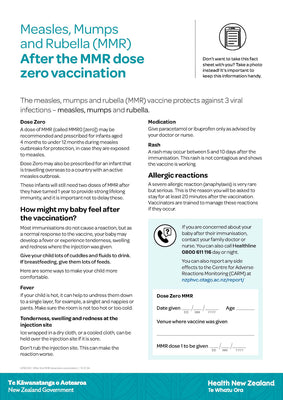After the MMR dose zero vaccination - HP8229

Information for parents and caregivers about MMR dose zero.
The full resource:
Measles, Mumps and Rubella (MMR) After the MMR dose zero vaccination
The measles, mumps and rubella (MMR) vaccine protects against 3 viral infections – measles, mumps and rubella.
Dose Zero
A dose of MMR (called MMR0 [zero]) may be recommended and prescribed for infants aged
4 months to under 12 months during measles outbreaks for protection, in case they are exposed to measles.
Dose Zero may also be prescribed for an infant that is travelling overseas to a country with an active measles outbreak.
These infants will still need two doses of MMR after they have turned 1 year to provide strong lifelong immunity, and it is important not to delay these.
How might my baby feel after the vaccination?
Most immunisations do not cause a reaction, but as a normal response to the vaccine, your baby may develop a fever or experience tenderness, swelling and redness where the injection was given.
Give your child lots of cuddles and fluids to drink. If breastfeeding, give them lots of feeds.
Here are some ways to make your child more comfortable.
Fever
If your child is hot, it can help to undress them down to a single layer, for example, a singlet and nappies or pants. Make sure the room is not too hot or too cold.
Tenderness, swelling and redness at the injection site
Ice wrapped in a dry cloth, or a cooled cloth, can be held over the injection site if it is sore. Don’t rub the injection site. This can make the reaction worse.
Medication
Give paracetamol or ibuprofen only as advised by your doctor or nurse.
Rash
A rash may occur between 5 and 10 days after the immunisation. This rash is not contagious and shows the vaccine is working.
Allergic reactions
A severe allergic reaction (anaphylaxis) is very rare but serious. This is the reason you will be asked to stay for at least 20 minutes after the vaccination. Vaccinators are trained to manage these reactions if they occur.
If you are concerned about your baby after their immunisation, contact your family doctor or nurse. You can also call Healthline 0800 611 116 day or night. You can also report any side effects to the Centre for Adverse Reactions Monitoring (CARM) at nzphvc.otago.ac.nz/report/.